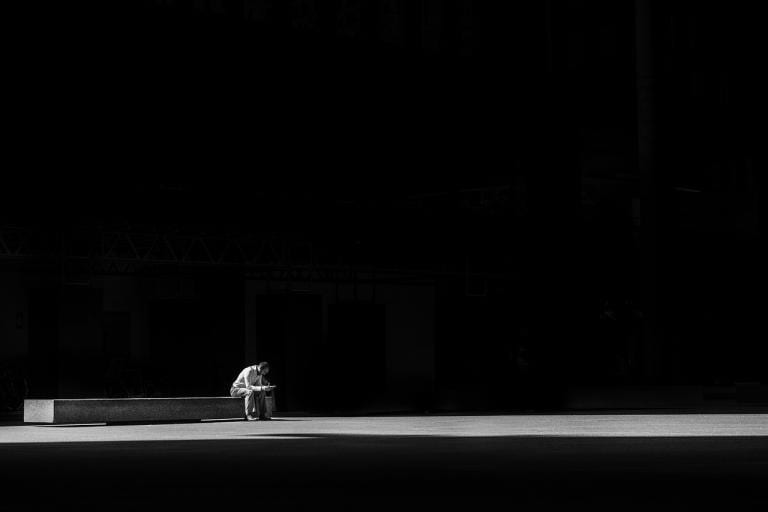Yesterday, Pope Francis alluded to the lesser evil argument in relation to contraception and the Zika virus. Fortunately, social media only mildly exploded about this — because it was too busy exploding about the exchange between Francis and Trump. But actually, this is much more important and interesting.
I’ve been trying to get my head around the lesser evil thing, and frankly, it hurts. Why? Simply put, because there doesn’t seem to be a lot of agreement about this – and people on both sides of the debate are absolutely certain that their side is right and that the other side is deeply and damnably wrong.
Not just wrong, in many cases, but unCatholic. In heresy. Defying the tradition, leading others astray, justifying monstrosities.
Those who argue in favour of the lesser evil would say, for example, that it’s morally hideous to suggest that it’s immoral to lie if it’s necessary to do so in order to save a human life. They urge the common example of a person who is hiding a Jew in their home and who is asked, point blank, whether there are any Jews in their house by a Nazi. Obviously in such a case the usual go-to (simply and honestly refusing to answer the question since the person asking has no right to the information) is not a real option: if you tell the Nazi “I refuse to answer that,” he will interpret that as a “yes” and will search your house.
In such a case, according to the lesser evil argument, you’re not actually choosing between an intrinsic evil (lying) and a neutral action (refusing to answer.) You’re choosing between, on the one hand, the evil of lying and on the other hand the evil of betraying those who have entrusted their lives to you. Clearly, a betrayal that leads to death is a much greater evil than lying to someone who intends to use the truth for evil purposes, therefore the lie is the lesser evil.
Those who urge against this position hold that willing participation in evil is never necessary, nor is it ever justified. They would argue that tolerance of evil is something allowable, as, for example, in a case where a pro-life politician votes for a law that allows abortion under certain restrictions because the only alternative is a law which permits abortion in all cases. In such a case the politician is really voting for the restrictions on abortion – he is choosing the good which is possible, even though it requires him to tolerate an evil which he is powerless to remove.
Basically, according to this analysis you can perform an action which appears evil only if you are actually honouring the law of double-effect – that is, where an action has both good and evil effects, and you tolerate the evil effects while only intending the good ends. Intrinsically evil acts could never be justified under such reasoning.
The basis for holding this position is basically a concern that in allowing a person to do evil in order to accomplish some intended good you must logically fall into a morality in which the ends justify the means. From a rational perspective, the whole fabric of morality quickly begins to unravel as soon as you allow a person to deliberately do evil, even if it seems a very small evil and it is intended to prevent some very grave harm.
People on both sides of this debate frequently hold that people on the other side are malicious and probably stupid – lax and ignorant of Church teaching in the case of those who hold that one can choose the lesser evil; rigid and inhumane in the case of those who hold that you can’t. This, to me, seems quite insane. The truth is that this is one of the most difficult and sensitive questions in all of moral theology and it is clearly evident that any two highly intelligent people with upright consciences and tremendous good will might easily take up opposite positions.
Really, I’m inclined to say that if you don’t find yourself pulled in both directions by this quandary, you probably haven’t understood it very well.
At the heart of the debate lies the fact that we are constantly confronted with two very different concerns. On the one hand, we desire a moral system that is clean, rational, air-tight and well organized. We want a moral law that is reflective of the perfectly ordered interior life of God. We desire consciences that are formed in the image of an absolute Divine Good.
On the other hand, we find ourselves constantly making decisions in a world that is extremely messy, irrational, sloppy and chaotic. The moral reality in which we operate is disorderly, and we must recognize our human limitations as we try to navigate it. No moral system can perfect the fallen world, nor can it be redeemed by human acts. We are therefore forced to act imperfectly, and to rely on God to perfect our faltering efforts.
The attempt to reconcile these two realities demands that we live, continuously, in tension. It prevents us from having the kind of moral certainty that we would like to have. My personal suspicion is that both of these positions are essentially true. We know, for example, that the Church teaches that when a person takes someone else’s property in order to secure their own basic needs (the Jean Valjean problem), this is not truly stealing because there is a principle deeper than private property which underwrites their action – namely, the universal destination of goods.
It seems reasonable to suppose that similar principles might exist in other cases, even if they haven’t been fully articulated at this stage in the history of the development of doctrine. In the case of the “justified lie,” for example, it seems intuitively that there is some sense in which it is not “lying” to tell an untruth to someone who wants to use the truth to do violence. Similarly, using contraceptives in extreme hard cases (as Pope Francis recently semi-suggested with respect to the Zika virus) seems, intuitively, as though it might not really be the sin of contraception. Right there, at the edge of your consciousness, there’s a niggling sense that you can see some more fundamental law that might change the moral character of the act.
Perhaps what we’re really meant to learn from hard cases like this is that morality, the Good, is ultimately not something that we can grasp entirely. It’s not a construct of human philosophies or even of dogmatic moral theologies. It’s something that we strive towards with all of our strength, all of our hope, with our hearts and our souls – but which, ultimately, we don’t have the capacity to reach by our own efforts. The Good may be fundamentally inaccessible, not merely in practice, but also in theory.
This pushes us back to the virtue of humility. It forces us to make moral decisions not on the basis of our own reasoning, our social constructs, our perfect doctrines, but rather to take our confusion, our brokenness, our blindness, our imperfection and to meet God in the interior temple of the conscience. It means that moral action must grow out of a relationship with God rather than a relationship with our own reason or with an impersonal moral law.
Image credit: pixabay
Stay in touch! Like Catholic Authenticity on Facebook:













